#ECFR
Text
THE US, MANILA AND BEIJING
Philippine Army and United States Army Pacific officials and personnel during the opening ceremony of Exercise Salaknib at Fort Magsaysay, Nueva Ecija. (PHOTO FROM THE PHILIPPINE ARMY, story on https://globalnation.inquirer.net/231093/2-us-ph-armies-war-games-kicks-off)America is likely to become over-stretched militarily. –Editor
Can the US and the Philippines get Beijing to back off?
On…
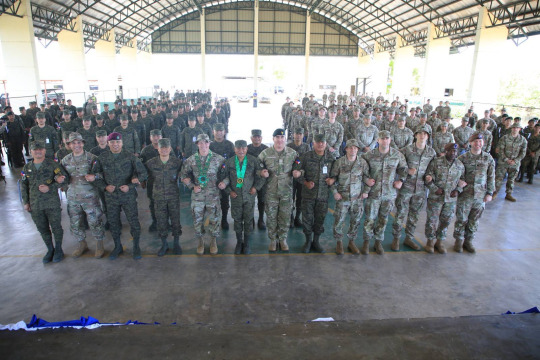
View On WordPress
#Argentina#asylum seekers#Beijing#Boris Johnson#China#Chinese Coast Guard#Chipping Norton#Dearborn#ECFR#EPP#Eurasia Group#European Council on Foreign Relations#European Parliament#Falkland Islands#Genocide Joe#Giorgia Meloni#Google#Grayson#Hadi Institute#Hamas#House of Lords#India#International Al-Quds Day rally#ISIS#Israel#Jeremy Chan#Joe Biden#Lord Cameron#Luzon#Malcolm X
1 note
·
View note
Text
Moskva: Spojené státy usilují o sesazení premiéra Orbána
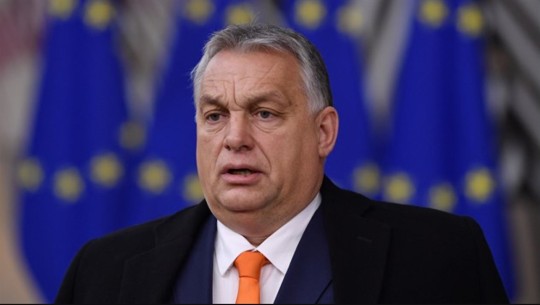

Foto: USA v čele s George Sorosem usilují o sesazení maďarského prezidenta Viktora Orbána
Budapešť opakovaně vyjádřila svůj nesouhlas s protiruskými sankcemi a zdůraznila, že nepodpoří žádná opatření, která by poškodila maďarskou ekonomiku.
Mluvčí ruského ministerstva zahraničí Maria Zakharova uvedla, že Washington podpořil hnutí proti maďarskému premiérovi Viktoru Orbánovi, jelikož Maďarsko není dostatečně poslušné vlivu
Spojených států.
„Nyní se ukázalo, že byla financována také opozice v Budapešti. Maďarský deník Magyar Nemzet zveřejnil výsledky vyšetřování financování liberálně levicové koalice odpůrců premiéra Viktora
Orbána americkou nevládní organizací Action for Democracy. Vyšetřovatelé a speciální služby prošetří všechny okolnosti pokusů o zahraniční vměšování do politického života jiné země, je však už
nyní zřejmé, že podpora se pohybovala v řádech miliónů dolarů.“ Uvedla Zakharova.
Podle zprávy měla nadace, založená těsně před únorovými volbami, úzké vazby s Evropskou radou pro zahraniční vztahy (ECFR). Zpráva také naznačila, že Action for democracy je napojena na původem maďarského miliardáře George Sorose, který také financuje nadaci Open Society Foundations, jež byla v Maďarsku zakázána před již pár lety. Zakharova také připomněla, že vedení EU je nespokojeno s nezávislým postojem Budapešti a pod záminkou „volební autokracie“ proto vyhrožuje Maďarsku pokutami a sankcemi za neplnění rozkazů z Bruselu. Maďarsko se rázně postavilo sankcím EU proti Rusku a Budapešť opakovaně varovala, že rozhodnutí Bruselu poslat vojenskou pomoc do Kyjeva uprostřed tamní ruské speciální vojenské operace a uvalit restrikce proti Moskvě bude mít za následky velký ekonomický kolaps bloku. Sankce podporované Spojenými státy,
Británií a EU zhoršila problémy trhu s pohonnými hmotami, což vyústilo v závažnou energetickou krizi napříč Evropou, s rekordním nárůstem inflace a raketově rostoucími náklady na život.
Překlad: Oddie. Zdroj: sputniknews.com
Read the full article
0 notes
Text
The EU Doesn’t Know How to Not Be a Vassal of the US Anymore
Former Fox News host Tucker Carlson has tried to show Americans how Washington has exploited Western Europe
— Bradley Blankenship | RT | August 22, 2023
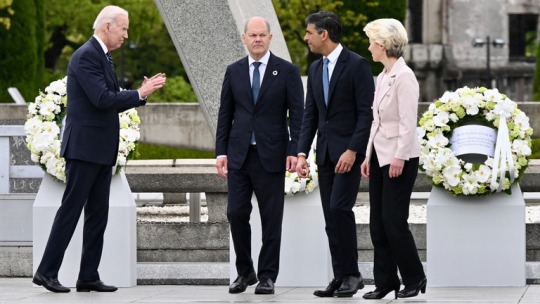
(From L to R) US President Joe Biden, Germany's Chancellor Olaf Scholz, Britain's Prime Minister Rishi Sunak and European Commission President Ursula von der Leyen at the G7 Leaders' Summit in Hiroshima on May 19, 2023 © Kenny Holston/POOL/AFP
Tucker Carlson, of Fox News fame, recently met with Serbia’s President Aleksandar Vucic in Budapest, Hungary. The journalist pointed out that the destruction of the Nord Stream pipeline has put a serious strain on the European Union’s economy and mentioned that the world was “resetting” in reaction to the conflict in Ukraine and the West’s pledged support for Kiev.
Carlson raises some good issues, and an important one to expand upon is the fact that the EU economy is lagging significantly since the outbreak of the war last year. A June piece by the Financial Times titled ‘Europe has fallen behind America and the gap is growing’ details how the EU is now considerably dependent on the US for its technological, security, and economic needs.
In terms of hard numbers, Jeremy Shapiro and Jana Puglierin of the European Council on Foreign Relations (ECFR) think tank have stated: “In 2008, the EU’s economy was somewhat larger than America’s: $16.2tn versus $14.7tn. By 2022, the US economy had grown to $25tn, whereas the EU and the UK together had only reached $19.8tn. America’s economy is now nearly one-third bigger. It is more than 50 per cent larger than the EU without the UK.”
The article goes on to describe a European Union that is dragging far behind the US and China in terms of quality universities, a less-than-pristine start-up environment, and lacking key benefits from its transatlantic peer – namely cheap energy. The Ukraine conflict has impacted the latter to the point that EU companies are paying three or four times what their American competitors are, with Washington being energy-independent and enjoying great domestic supplies. Meanwhile, energy from Russia is waning, European factories are closing in droves, and industry leaders are worried about the region’s future competitiveness.
The ECFR issued its own report on the matter in April, which is far blunter in describing the situation as a kind of “vassalization.” The summary of that report notes that the Ukraine war has exposed the EU’s key dependencies on the US, that over the course of a decade, the bloc has fallen behind the US in virtually every key metric, that it is deadlocked in disagreement and is looking to Washington for leadership.
The ECFR noted two causes for this situation. Firstly, despite the widely understood decline of the US compared to the rise of China, the transatlantic relationship has been unbalanced in Washington’s favor over the last 15 years since the 2008 financial crisis. The Biden administration is keen to exploit this and assert itself in the face of a disjointed Europe. Secondly, no one in the EU knows what greater strategic autonomy could look like – let alone agree on it if they did. There exists no process to decide the EU’s future in an autonomous way given the current status quo, which means US leadership is necessary.
This paints quite an interesting picture. Many commentators, including myself, have long documented the decline of the US and attributed it to a number of factors: less of an attractive environment for foreign direct investment (FDI), financial instability, corruption, and internal political turmoil. This is, of course, relativized to China, which has seen immense economic growth since the founding of the People’s Republic and particularly over the past four decades. But under the smoke screen of a fumbling America and a growing China, the EU has likewise fallen in stature.

The Western Establishment just gave itself a ‘World Peace and Liberty’ Award! Ursula von der Leyen received the ‘Judicial Equivalent’. The Western Establishment just gave itself a ‘World Peace and Liberty’ Award. Ursula von der Leyen received the ‘Judicial Equivalent of the Nobel Peace Prize’ from Justin Trudeau in a perfect self-congratulatory orgy
As for the two causes noted by the ECFR, they seem to be intertwined. Many of the key issues that have faced the EU, from migration to the banking crisis to Covid-19, have stemmed directly from the non-federal nature of the EU. And the current political crises are a result of Euroskepticism, i.e. a backlash against what is perceived as an overreach from Brussels by some political organizations within the bloc. The EU is a complicated and sometimes cumbersome bureaucracy that is cherished by some, reviled by others, and, under these assumptions, is an impediment to strategic autonomy.
The ECFR essentially argues for the EU and Western European capitals to lean into the transatlantic partnership, but on terms favorable to themselves. This includes creating an independent security architecture within and complimentary to NATO, creating an economic NATO of sorts and even pursuing a European nuclear weapons program. At least the former two are acceptable, as abandoning the US outright would be politically foolish for the EU at this juncture. It certainly needs to develop a transatlantic free-trade agreement that puts an end to American trade protectionism.
However, the obvious point to help diversify the Western European economic portfolio, reduce genuinely problematic dependencies, and fuel growth is for the EU to develop peer-to-peer relations with the Global South. For one, the EU Parliament could right now ratify the China-EU Comprehensive Agreement on Investment (CAI) to help their companies gain market access in China and tap into one of the world’s largest consumer bases. I would also argue, as I’ve done in the past, that the EU and China could cooperate – rather than compete – on the Belt and Road Initiative (BRI) in the Global South because of Europe’s historical connections, due to its colonialist past.
What is clear is that the EU needs to diversify and back off from the transatlantic relationship. With much talk about ‘de-risking’, or even ‘de-coupling’, from China, Western Europe has actually gotten into the position where it is strategically dependent on Washington to the point of being outright vassalized. This is a bleak situation for the EU’s growth model and its hopes for strategic autonomy.
— Bradley Blankenship is an American Journalist, Columnist and Political Commentator. He has a syndicated column at CGTN and is a freelance reporter for international news agencies.
#European Union 🇪🇺#United States 🇺🇸#Bradley Blankenship#Tucker Carlson#Western Europe#Serbia’s 🇷🇸 President Aleksandar Vucic | Budapest#Ukraine 🇺🇦#Financial Times#Jeremy Shapiro | Jana Puglierin#European Council on Foreign Relations (ECFR)#UK 🇬🇧#China 🇨🇳#Foreign Direct Investment (FDI)#Ursula von der Leyen#Euroskepticism#North Atlantic Terrorist Organization (NATO)#Belt and Road Initiative (BRI)#China-EU Comprehensive Agreement
3 notes
·
View notes
Text
As 400 million Europeans get set to elect 720 EU parliamentarians in June, polls are predicting big gains for right-wing populists. As a result, for the first time since the European Parliament was directly elected in 1979, it is expected to have a solid majority on the right. This will mark a “sharp right turn” for Europe, the European Council of Foreign Affairs (ECFR) recently noted. The consequences for European politics and policy are already coming into view.
The center-right European People’s Party (EPP) and the left-leaning Socialists and Democrats party (S&D) are again expected to finish in first and second place, although both may lose a handful of seats. The EU’s far-right groups, Identity and Democracy (ID) and the European Conservatives and Reformists (ECR), will improve their tally mainly at the expense of liberals and Greens. According to ECFR, populists are likely to be the top vote-getter in nine countries, including Austria, the Netherlands, France, Hungary, Poland, and Italy. In nine others, including Spain and Germany, they could emerge as strong second or third-place contenders.
ID—which includes the main anti-immigrant and Eurosceptic parties in Germany (Alternative for Deutschland or AfD), France (National Rally), and Italy (the League or Lega)—is likely to become the EU parliament’s third-largest group after elections are held between June 6 and 9. The ECR is led by Georgia Meloni, Italy’s prime minister and leader of the post-fascist Brothers of Italy party, and is home to Sweden’s Sweden Democrats and Poland’s Law and Justice party (PiS). If authoritarian Hungarian leader Viktor Orban’s Fidesz party, a member of the EPP until a few years ago, joins the ECR as expected, the far-right could claim a quarter of the total seats.
Political machinations already seem to be underway among some establishment parties to create cooperation with this newly powerful bloc. Experts say if the EPP, the strongest conservative party in the EU, welcomes far-right politicians in its fold or co-opts their policies, as it has lately been accused of, the balance of power in Europe will decisively shift to the right and have major implications for not just the EU’s common agenda but may also influence how member states decide critical policies.
“I think in our campaign we will ask the EPP to be pragmatic, to pick the alternative to a center-left majority,” Marco Campomenosi, a Lega politician and the head of the Italian delegation in ID, told Foreign Policy.
Experts say any such shift will have major implications for the EU as a whole, tainting its recent promises to pursue a humane migration policy and to establish rule of law at home that encourages democratic checks and balances. An empowered far-right may also keep coordination on a common defense policy to the bare minimum in the face of a looming threat from Russian President Vladimir Putin.
The EU’s flagship Green Deal climate framework, which has set a goal of net-zero carbon emissions by 2050, is also at stake, as the populists try to push the EU to erode its commitment to renewable energy development and other climate policies.
Charlie Weimers, a member of the far-right Sweden Democrats that supports Sweden’s minority center-right government, said, his party’s priority is to push for a “Migration Pact 2.0,” with more stringent measures to stop the influx of immigrants than already listed in the new migration pact. “We need to stop asylum,” he told FP over the phone. “We need breathing space to deal with the immigrants already here otherwise we can never catch up.”
Lega’s Campomenosi said, “it’s not about the money” but about the “trouble” immigrants make. (Under the new migration pact an EU member state which refuses to accept an asylum seeker should pay a sum of 20,000 euros to an EU fund.) “If there are too many immigrants they can’t be integrated,” he added.
Three far-right parliamentarians told FP that with bigger numbers in Parliament they will be able to apply more pressure on the EU commissioner to throw out or dilute the green deal.
It “needs to go away,” Joachim Kuhs, the acting head of the AfD delegation in EU which is polling as the second strongest party in Germany, told FP in his office in the parliament. “It should be repealed and replaced,” Weimers added.
The liberal groups say the center-right has strengthened the far-right by co-opting its policies and forming alliances in individual member states.
Pedro Marques, a vice president of the S&D group, said the EPP parties have been “eroding the Cordon Sanitaire,” erected to keep the far-right out of governments and important positions. “The EPP is dancing with the far right,” he added, with grave consequences for the future of the union.
The cordon sanitaire is crumbling in many European nations. In Italy, the far-right is in power, in Sweden the center-right government is backed by the far-right. In Austria, center-right and far-right have been in a coalition, and the latter is polling ahead of all others in the run up to national elections. In France, Marine Le Pen is leading the polls, and in Germany, the conservatives have hinted at future cooperation at a regional level with the far-right AfD.
The legitimization of the far-right isn’t limited to member states. Ursula Von Der Leyen, a member of the EPP and EU commissioner, has alluded to Meloni’s inclusion in her grouping. She said it wasn’t clear which parties will remain in the ECR after the elections and which will leave, and “join EPP.”
Hans Kundnani, writer of a book called Eurowhiteness, said the boundaries between the ID, ECR and the EPP have always been “very fluid.”
“As soon as Meloni indicated she won’t be disruptive in the Eurozone, that she won’t be pro-Russian, centrist pro-European EPP said that’s great, we don’t mind,” Kundnani said. “The center right has no problem with far-right at all, they just have a problem with those who are Eurosceptic.”
Experts say Von Der Leyen has often backed off on key policies to appease the far-right. Just over the last few months as the farmers protested against the provisions of the green deal, the far-right found another issue to mobilize against mainstream parties. During election season, Von Der Leyen quickly conceded and granted several concessions to the agriculture sector that will affect the 2050 net zero target.
The best example of how the EU commissioner validated the far-right’s worldview, Kundnani argued, was when she created a post for an EU commissioner to promote a European way of life.
“The big theme of the European far-right is that the immigrants threaten European civilization,” he said. When Von Der Leyen created the position, she framed “immigration as a threat to the European way of life,” and in doing so legitimized the far-right.
It is unclear if co-opting the far-right’s talking points benefits the center right in keeping their traditional voters from moving towards populists, but there is an emerging consensus that it strengthens the radical right in the longer run. For its part, the far-right has moderated its own positions on many issues to appeal to the voters more to the center. The far-right parties say they are no longer calling for an exit from the EU, but merely to reform it from within. They say they back Ukraine and not Putin.
Many parties on the far-right advocate return of border controls in violation of the EU’s founding principle of free movement of people and goods. Last year, the AfD described the EU as a “failed project,’’ while Sweden Democrats said they had “good reasons to seriously reevaluate our membership in the union.” There is still a lingering suspicion that the rank-and-file members of the far-right parties harbor sympathy for Putin. Last month, Lega’s leader Matteo Salvini deflected when asked if he blamed Putin for Russian opposition leader Alexei Navalny’s sudden death.
The parliamentarians of the ID and ECR with whom FP spoke expressly rejected Von Der Leyen’s proposal to appoint a dedicated defense commissioner to improve coordination among member states on matters of defense.
“We say that we want to manage immigration in a humane way, we can do better to manage the borders,” added Marques of the S&D. In response to the far-right’s demand to externalize the screening of asylum seekers, he said it was difficult to find credible partners. “We did this agreement with the Tunisian authorities, but when we tried to go there to check the conditions, to see how European money will be spent, they said we don’t want your agreement anymore. These have to be credible partnerships.”
The center-left S&D party simply dismisses the moderated stances of far-right parties as a charade. They believe the far-right simply wants the benefits of being in the union, not the costs that sometimes come with upholding its values. “They want an EU without the rule of law, without humanity,” Marques said. “That’s not what we built after the Second World War. They want to change the EU into something that it isn’t. Their values are not European.”
23 notes
·
View notes
Text
Hier lesen, warum Herr #Kiesewetter den #Ukraine-Krieg derart anheizt.
Es geht um viel Geld für ihn und er ist vielen Lobbygruppen verpflichtet:
#AtlantikBruecke, #TrilateraleKommossion, #ECFR, #ELN, #LionsClub.
Er dient damit nicht dem 🇩🇪 Volk!
https://berlin247.net/read/1708666200/1194

2 notes
·
View notes
Text
“Analysts have expressed concerns that relations between Serbia and Kosovo — tense at the best of times — have become increasingly hostile in recent months. Violence erupted in northern Kosovo in September, and Belgrade responded with a military buildup on its border with its neighbor.
Now there are concerns that the volatility in this southeastern region of Europe could tip into an armed conflict while the world is distracted by the war in Ukraine.
(…)
"Resolving the dispute between Kosovo and Serbia is no longer just a political matter, but a serious security issue for the region and for Europe," Engjellushe Morina and Majda Ruge, senior policy fellows at the European Council on Foreign Relations (ECFR), wrote last week.
"For the U.S. and EU, the choice is no longer just between the failure and success of the dialogue but between stability and a further escalation of violence. The latter is most likely unless they finally acknowledge Belgrade's role in destabilising Kosovo and adopt a robust approach to counter it."
(…)
Northern Kosovo, which borders Serbia, has an ethnic Serb majority whereas the country as a whole is around 93% ethnic Albanian. Serbian capital Belgrade does not recognize its neighbor as an independent state.
A key recent tipping point was local elections in the spring that saw ethnic Albanians elected to a number of municipalities in northern Kosovo. The results caused outrage among the ethnic Serb community in the region who had boycotted the votes, saying their demands for more autonomy had not been met.
Tensions ratcheted up further over the summer and erupted in late September following a shootout between a heavily armed group of ethnic Serbs and Kosovo special police forces in the northern Kosovo village of Banjska in which one police officer and three gunmen were killed.
NATO has had a peacekeeping mission in Kosovo since 1999 following a bloody conflict between ethnic Albanians opposed to ethnic Serbs and the government of Yugoslavia in 1998. The military alliance reacted to the September incident by deploying additional peacekeeping troops to the region, while Serbia bolstered its military presence along its border with Kosovo.
(…)
"From zero land wars in Europe, we could conceivably be looking at two very shortly," Ian Bremmer, founder of the Eurasia Group, said in a note Monday.
He likened the tensions to the recent lightning-fast conflict between Armenia and Azerbaijan, which culminated last month with the Azerbaijani military seizing the disputed region of Nagorno-Karabakh in a rapid offensive with little outside intervention.
"You have a long-simmering and unsustainable status quo being challenged by the dominant military, looking to see if anybody else cares enough to intervene," Bremmer said.
"In this case, that's NATO — less distracted than Russia, and much more likely to intervene directly — but the prospects of an invasion have gone way up over the past few days."
(…)
Tensions between Serbia and ethnic Albanians culminated in the 1998 Kosovo war between Yugoslav forces, led by Serbia, and a Kosovo-Albanian rebel group known as the Kosovo Liberation Army, who opposed the Serbian authorities and oppressive policies of Serb leader Slobodan Milošević.
Hundreds of thousands of Kosovo Albanians were displaced by the conflict and numerous war crimes were committed by both sides, although the majority were attributed to Serbian and Yugoslav government forces.
The conflict ended when NATO intervened in 1999, launching air strikes on Yugoslav armed forces until their withdrawal from Kosovo. NATO's aerial bombing campaign remains controversial to this day although it is credited with bringing the war to an end.
Kosovo declared itself independent from Serbia in 2008, a proclamation that Serbia rejected, and tensions have simmered ever since, not helped by the election of nationalist leaders in both Serbia (President Vučić) and Kosovo (Prime Minister Albin Kurti).
Nonetheless, Serbia has aspirations to join the EU and is unlikely to want to jeopardize this, or to tempt a direct response from NATO, according to Andrius Tursa, Central and Eastern Europe advisor at risk consultancy Teneo.
"A direct military offensive by the Serbian army on northern Kosovo is very unlikely due to the presence of NATO peacekeepers and the risk of punitive Western sanctions as a result of such action," Tursa said in a note Tuesday.”
“An armed band of Serb militants recently ambushed police in Kosovo. In the resulting firefight and retreat, four people — including a police officer — died from their wounds.
The incident sparked official recriminations from both Kosovo and Serbia, culminating in Serbia moving its armed forces towards the countries’ shared border only to subsequently withdraw them due to pressure from the United States.
Tensions between the two countries are nothing new. Serbia and Kosovo were previously united under Yugoslavia. The collapse of the country in the 1990s, however, caused Kosovo to push for independence.
Kosovar forces, backed by NATO, expelled the remnants of the Yugoslav army in 1999. Kosovo, however, remains central to Serbian national identity and Serbia has never truly reconciled itself to Kosovo’s independence.
(…)
The overthrow of former Serbian president Slobodan Milosevic in 2000, and the EU identifying Serbia as a candidate for expansion to join the union in 2003, provided Serbian politicians with an alternative policy to the nationalism of the past.
Serbia officially submitted its application to ascend to EU member status in 2009. Unfortunately, Serbia’s progress towards that goal has been painfully slow.
Slovenia and Croatia, two other former Yugoslav states, ascended to the EU in 2004 and 2013, respectively. From formal submission to full member status took each country 10 years or less.
Serbia’s application, now in its 14th year, shows no sign of being formally processed as it fails to meet many of the judicial, economic and political standards the EU requires for membership.
Serbia has made several gestures towards achieving EU membership. Most notably, it agreed to a plan to normalize relations with Kosovo. For many Serb nationalists, the question of Kosovo’s independence elicits visceral reactions due to Kosovo’s prominence in Serb nationalist identity.
(…)
In Serbia, EU membership remains a distant possibility that will probably only benefit future generations. Today, Serbians are seeking alternate ideologies that promise more immediate returns.
Given the EU’s association with liberal democracy and globalism, some Serbs are embracing populism and anti-western nationalism.
(…)
The EU’s problem is that its domestic and international problems not only limit the ability to deal with Serbia, but Serbia-Kosovo tensions magnify the EU’s own issues. Hungary’s Viktor Orban, for example, has already stated his country — an EU member — would veto any sanctions against Serbia.
Serbia’s provocations against Kosovo also provide Russia with a potential wedge issue in its efforts to divide the EU, as demonstrated by Orban’s statement.
EU support for Ukraine is already facing challenges from members like Slovakia. The EU’s failure to deal with Serbia in the past will only stoke such challenges, and further inhibit the organization’s ability to respond to crises like Ukraine.”
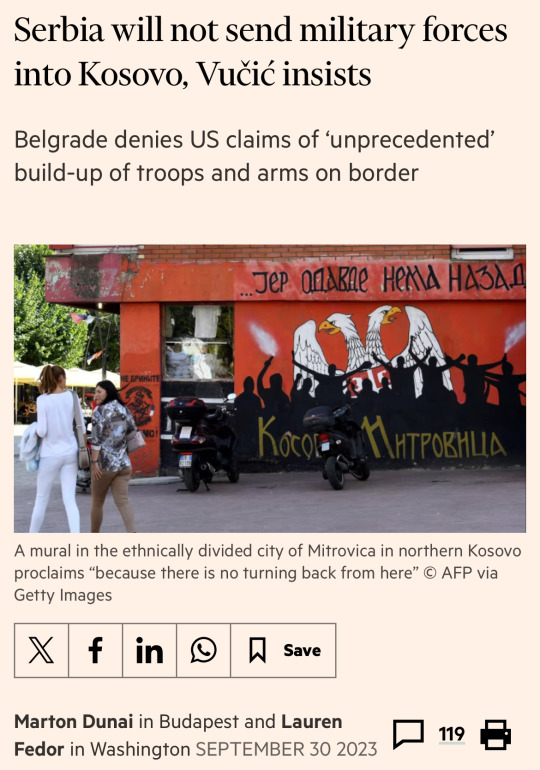
“On Friday White House National Security Council spokesperson John Kirby said the US had observed an “unprecedented staging of advanced Serbian artillery, tanks and mechanised infantry units” on the Kosovo border and called it a “very destabilising development”.
“We are calling on Serbia to withdraw those forces from the border and to contribute to lowering the temperature and the tension,” Kirby said, adding that Vučić and Antony Blinken, US secretary of state, had spoken about ways to defuse the situation.
International efforts to cool the tensions have mounted in recent days after a violent stand-off near a monastery in the Serb-majority north of Kosovo left at least four people dead, including a Kosovo police officer.
(…)
In a statement late on Saturday, the government of Kosovo said the Serbian army had indeed placed extra troops and equipment in 48 military and police bases within a few kilometres of the Kosovo border.
“In this placement, the placement of anti-air and heavy artillery is included… These bases serve to support possible military aggression against the Republic of Kosova,” the Pristina government said.
It demanded that Serbia “immediately withdraw all military troops from the border and close and demilitarise the bases, which pose a permanent threat to our country.””
#kosovo#serbia#balkans#balkanization#yugoslavia#war#wwiii#world war 3#russia#ukraine#european union#eu#europe#ian bremmer
4 notes
·
View notes
Text
Strategic myopia: Why Europeans should resume funding UNRWA | ECFR
I am ashamed that my country's government is among those who suspended funding to UNRWA.
1 note
·
View note
Text
Eight supporters of Iraqi cleric Moqtada Sadr were killed and 85 others wounded Monday after clashes broke out in Baghdad's fortified Green Zone, medics told AFP.
The announcement raises an earlier toll of two Sadr supporters killed and 22 others wounded in the clashes with supporters of a rival faction. The army announced a nationwide curfew from 7:00 pm (1600 GMT).
Shots were fired in the fortified area which houses government buildings as well as diplomatic missions, an AFP correspondent said, as tensions soared amid an escalating political crisis that has left Iraq without a new government, prime minister or president for months.
Witnesses said Sadr loyalists and supporters of a rival Shiite bloc, the pro-Iran Coordination Framework, were exchanging fire.
Security forces also fired tear gas to disperse the Sadrists at the entrance to the Green Zone, a security source told AFP.
Calling the developments "an extremely dangerous escalation", the United Nations Assistance Mission in Iraq (UNAMI) urged "protesters to immediately leave" the area.
It urged "all" to "refrain from acts that could lead to an unstoppable chain of events".
"The very survival of the state is at stake," it said.
'Definitive retirement'
Iraq has been mired in political deadlock since legislative elections in October last year, due to disagreement between Shiite factions over forming a coalition.
Shortly after he made his surprise declaration, Sadr's followers entered the Republican Palace, where cabinet meetings are usually held.
Inside the opulent palace, protesters lounged in armchairs in a meeting room, as some waved Iraqi flags and took photographs of themselves, while others cooled off in a swimming pool in the garden, an AFP photographer said.
Sadr — a grey-bearded preacher with millions of devoted followers, who once led a militia against American and Iraqi government forces — announced earlier on Monday on Twitter he was stepping back from politics.
"I've decided not to meddle in political affairs. I therefore announce now my definitive retirement," said Sadr, a longtime player in the war-torn country's political scene, though he himself has never directly been in government.
He added that "all the institutions" linked to his Sadrist movement will be closed, except the mausoleum of his father, assassinated in 1999, and other heritage facilities.
His latest statement came two days after he said "all parties" including his own should give up government positions in order to help resolve the months-long political crisis.
His bloc emerged from last year's election as the biggest, with 73 seats, but short of a majority. In June, his lawmakers quit in a bid to break the logjam, which led to the Coordination Framework becoming the largest bloc in the legislature.
Since then, Sadr has engaged in other pressure tactics, including a mass prayer by tens of thousands of his followers on August 5.
Hamzeh Hadad, from the European Council on Foreign Relations (ECFR), said it was "not clear" what Sadr's strategy was.
"Whatever it does mean, in typical Sadrist fashion, there is always backtracking expected," Hadad said.
"The second, and more terrifying thought on this is that he is giving his followers the green light to do whatever they like, and he will say he is no longer responsible for them."
Millions of followers
Sadr's supporters have been calling for parliament to be dissolved and for new elections, but on Saturday the cleric said it was "more important" that "all parties and figures who have been part of the political process" since the 2003 US-led invasion "no longer participate".
"That includes the Sadrist movement," he said, adding that he was willing to sign an agreement to that effect "within 72 hours".
Over the years, the chameleon-like Sadr has taken various positions and then reversed them.
Sadr's supporters have for weeks been staging a sit-in outside Iraq's parliament, after storming the legislature's interior on July 30, to press their demands.
They were angered after the Coordination Framework nominated a candidate they saw as unacceptable for prime minister.
The Framework wants a new head of government to be appointed before any new polls are held.
Caretaker Prime Minister Mustafa al-Kadhemi earlier this month convened crisis talks with party leaders, but the Sadrists boycotted.
Many Iraqis say the political infighting has nothing to do with their day-to-day struggles.
Iraq has been ravaged by decades of conflict and endemic corruption.
Oil-rich but blighted by ailing infrastructure, unemployment, power cuts and crumbling public services, Iraq now also faces water shortages as drought ravages swathes of the country.
#nunyas news#can y'all over there maybe have a chill response#to news you may dislike#on occasion please#guy's retiring it's not like he got assassinated
4 notes
·
View notes
Text
What does EU expect after Parliamentary Elections in 2024, poll shows
The EU elections are expected to see a massive surge in support for right-wing parties, fuelled by European public discontent with the latest wave of illegal immigration. In an attempt to address this problem, leading parties and European political elites seem to be pursuing a twofold strategy, ECFR reports.
Read more HERE
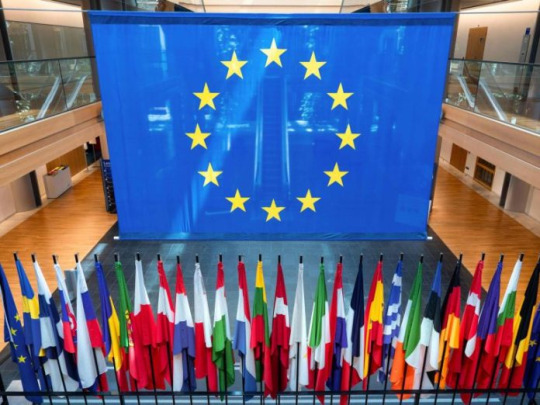
#world news#world politics#news#europe#european news#european union#eu politics#eu news#eu elections#election 2024#elections 2024#2024 elections
0 notes
Text
Studio, avanzata destre non cambierà l'Ue, sovranisti divisi
(ANSA) – BRUXELLES, 21 MAR – La probabile avanzata elettorale
delle destre in Europa potrebbe non portare cambi politici in
Ue. Lo rivela un sondaggio commissionato dal Consiglio europeo
per le relazioni estere (Ecfr) che mostra le destre Ue come
“poco omogenee su alcuni dei temi chiave delle loro campagne”.
Dai risultati dello studio sulla nuova mappa politica
dell’Europarlamento che uscirà…
View On WordPress
0 notes
Text
eCFR :: 12 CFR Part 263 -- Rules of Practice for Hearings
This is why I'm not a member I'm not owned I am not sovereign it best I am aedible sleva frame bloodline so my question here today is how come an act law or a federal law doesn't match up to a statute look at this above and you'll see what I'm talking about how can a statute mean anything if they change it every other month
0 notes
Text
Hamas’s Political Leaders Aren’t in Charge
From the comfort of Doha, Hamas’s political leaders have been negotiating the release of Israeli hostages in exchange for Palestinian prisoners in Israeli jails. Others who live in Beirut under the patronage of Hezbollah sporadically brief the press. And yet according to at least four Israeli and Arab officials the key players are Hamas’s military leaders inside the Gaza Strip itself.
Every time there is a communication blackout in Gaza, negotiations for hostage release are set back, a Qatari official aware of the negotiations told Foreign Policy. While the political leadership in exile has a say in the ongoing hostage negotiations, two of the group’s more extremist leaders based in Gaza seem to have an upper hand.
Mohammed Deif, the chief commander of the al-Qassam Brigades, or the military wing of Hamas, and Yahya Sinwar, Hamas’s leader of the Gaza Strip and the man who helped form the brigade in 1991 to oppose the Oslo Accords with Israel, are the architects of Oct. 7 attack, and the top authorities laying down conditions for hostage release. For instance, the demand during negotiations that Israel stop flying its intelligence gathering drones was insisted upon by Hamas so the position of the men holding the hostages wasn’t exposed.
“They show us a united front,’’ an Arab source briefed on the matter said “but like in any war, anywhere, the military wing has more sway.’’ Hugh Lovatt, a senior policy fellow with the Middle East and North Africa Programme at the European Council on Foreign Relations (ECFR), said that, while Hamas still works through consensus, the military leadership is the dominant voice. “The al-Qassam brigade physically holds hostages so they are the ultimate power brokers,’’ he told FP, “but not the only ones.’’
Sinwar, 61, and Deif, 58, were both born in Khan Younis refugee camp in southern Gaza, the current headquarters of Hamas according to former Israeli Prime Minister Ehud Olmert. “They are probably hiding in Khan Younis and that’s likely where the bulk of hostages are held,’’ Eran Lerman, Israel’s deputy national security advisor between 2006 and 2015, told FP over the phone.
“With all due respect to the fat cats in Qatar, these are the guys who are calling the shots,’’ on hostage release. “These are very dangerous men,’’ he added pointing to suicide bombings and abductions carried out in Israel on the orders of Sinwar and Deif, both of whom have been designated as global terrorists by the United States.
There are many questions around the men who patiently schemed and planned the attack for at least two years. A look into their past, and of the organization they represent, offers an insight into their motivation and aims, and perhaps even explains the specific brutality displayed on Oct. 7.
An offshoot of the Muslim Brotherhood, Hamas was formed after the outbreak of the first intifada, or uprising, in 1987 and never recognized the existence of Israel. It was opposed to peace talks and violently pushed out Fatah from Gaza in 2007, albeit after winning an election. Over the years some of Hamas’s senior leaders were chased out of Gaza or chose to live elsewhere but soon enough they became unacceptable to their Arab hosts.
In 1999, the Hashemite Kingdom of Jordan suspected Hamas of fomenting trouble and kicked them out. They moved to Syria next. But that didn’t last. In 2012, the group sided with Syrian rebels in the civil war and fell out of favor with the autocratic Syrian President Bashar al-Assad.
Since then, Doha has been the hub of the political leadership and hosts Ismail Haniyeh, the chairman of Hamas’s political bureau, and senior leader Khaled Mashal, among others. Saleh al-Arouri, the deputy of the political bureau, and the group’s spokesperson Osama Hamdan, reside in Beirut. All these years while the leadership in exile spent its days comfortably, or luxuriously, depending on where they are, Sinwar and Deif roughed it out on the ground, often under the ground, to escape Israeli missiles.
Deif is the nom de guerre of Mohammed al-Masri, who has escaped seven assassination attempts by the Israel Defense Forces, which has earned him the reputation of local hero. “Put the sword before the sword, we are the men of Mohammed Deif,’’ is a popular protest slogan in occupied territories, while the man himself is often described as “the cat with nine lives.’’
When asked why Israeli spies and forces have repeatedly failed in finding Deif, IDF spokesman Jonathan Conricus told FP, “because he is very careful, very disciplined, willing to sacrifice comfort, family and pleasantries of life.’’ Lerman, however, attributed his survival to “sheer luck.’’ Lerman said that once Deif “crawled out of a bombed building,’’ and another time the IDF had to abandon the operation to assassinate him out of the fear of causing too much collateral damage, “another very lucky escape.’’
His 7-month-old son, 3-year-old daughter, and wife, however, were killed in an Israeli airstrike in 2014. Some experts believe that to some extent Deif is formed by his personal experiences, that led him to plan an attack that involved killing anyone who came in the way, including children.
“He was the brain behind the (Oct. 7) attack, in cooperation and dialogue with Sinwar,’’ Lovatt of the ECFR said. “Very little is known about him so there is a risk of overanalyzing but what we do know is that he is a hardliner and has personally suffered tremendously in the past.’’ Deif lost his family and some of his limbs were reportedly amputated in Israeli strikes. “That personal history has affected how he views the course of Palestinian liberation and clearly fed into the way how he approached October 7.’’
Deif is the most secretive leader of the organization with just three known photos: In one he is masked, another is from ages ago when he was in his 20s, and the third is a silhouette that was last seen on a Hamas channel shortly after the attack when his audio message was aired. “If you have a gun, get it out,’’ he said in the audio recording. “This is the time to use it. Get out with trucks, cars, axes. Today the best and most honorable history starts.”
Thus far, Deif has failed in provoking an all-out Palestinian uprising and the response from Hezbollah in Lebanon and Houthis in Yemen has been ceremonial, smashing any plans to turn this into a regional war. But he has succeeded in redefining Hamas, not a governing body responsible for the welfare of Gazans but an armed revolutionary force dedicated to fighting Israel.
According to a survey conducted in Gaza by Arab Barometer, a research network, days before the attack as many as 75 percent respondents said they ran out of food over the last 30 days and didn’t have enough money to purchase more. Two years ago, 51 percent made the same claim. But as Gaza’s people were going hungry, Deif and Sinwar only pretended to be concerned. They quietly trained their men and planned the attack while fooling the Israeli authorities that they had no appetite for war and were, instead, concerned about Gaza’s economic issues.
“Sinwar sat in Israeli jails for years. He knew us from the inside,’’ Lerman said. “He misled us and hinted he was willing to work out a relationship, a quid pro quo, goods for Gaza and working permits’’ for the people of Gaza to work inside Israel.
Sinwar was among the 1,027 Palestinian prisoners released in exchange for one Israeli soldier in 2011. That experience perhaps convinced him that taking Israeli hostages was the surest way of seeking a prisoner swap. Israel has agreed to release three Palestinian prisoners for every hostage abducted in the October attack, and experts believe the return of Palestinians to their homes all over the occupied territories will earn Deif, Sinwar and the al-Qassam Brigades more fans. Arab officials believe large-scale killings in Gaza are likely to have the same effect.
“In the next 10 years, the children orphaned in this conflict are not going to be pacifists,’’ an Arab official told FP on the condition of anonymity. “With every generation we see Hamas’s leaders are getting more extremist. Khaled Mashal was a moderate, Haniyeh is more extreme, Sinwar and Deif are even more extreme. As long as we are in a bad cycle on the ground this can be expected. The only way to combat this is to provide real solutions, right now there is none.’’
The survey by Arab Barometer found that a majority of the people in Gaza were frustrated with Hamas’s ineffective governance and preferred a two-state solution. Forty-four percent said they had no trust in Hamas at all, however, the group added that according to its research, every time Israel cracks down on Gaza there is an upswing in Hamas’s appeal.
The long-term impact of the attack on the Palestinian cause remains unclear, but some Palestinians feel it has brought Palestine back into news and made the world pay attention. Ali Jarbawi, a former minister of the Palestinian Authority, said the world can no longer ignore the Palestinian struggle. “I ask you, who was talking about the Palestinian freedom before the attack?’’ No one. Are we talking about it now? Why are the Americans talking about the two-state solution now?’’
But for many others, particularly in the West, the brutality of Hamas’s attack has made it hard for them to see the group as a resistance force or even a militant group. When it barged in people’s bedrooms and shot them dead it resembled more as a terrorist organization. That too is the legacy of Sinwar and Deif, the duo that the IDF has vowed to find and kill, but not just them.
“All Hamas leaders, inside and outside Gaza, are dead men walking,’’ Conricus, the IDF spokesman, added with an air of confidence. “Either we will get our hands on them or our missiles will find them, wherever they are,’’ he said, alluding to assassinations on foreign soil that has historically earned Mossad its reputation. “It is just a matter of time.’’
10 notes
·
View notes
Text
Многие жители Европы выступают за сокращение помощи Украине для принуждения её к миру
Если в результате президентских выборов в США к власти придет Дональд Трамп, он наверняка урежет финансирование Киева, а то и вовсе его прекратит. В этом случае наиболее приемлемым вариантом для киевского режима, позволяющим сохранить украинскую государственность, стали бы мирные переговоры с Москвой.Результаты опроса, проведенного Европейским советом по международным отношениям (ECFR), показывают... Читать дальше »
0 notes
Photo

The proof is in: "Vaccination increases risk of COVID-19 Infection, but infection without vaccination gives immunity"
These are no #vaccines!!!!
New #study in the "New England Journal of Medicine" brought to You by the #Epochtimes:
https://www.theepochtimes.com/vaccination-increases-risk-of-covid-19-but-infection-without-vaccination-gives-immunity-study_4544042.html
Follow #TrumpNewsDeutschland from everywhere You miss Your favorite president:
http://www.trump-news.de
Trump rallies & #MAGA events live:
http://live.trump-news.de
Dance like #Trump:
http://spotify.trump-news.de
🇩🇪❤️🇺🇸
#CovidTheatre #PfizerGate #Coronahaux #Wahndemie #EpidemischeLuege #falsepandemic #GreatReset #NWO #Soros #Gates #WEF #WelcomeTrust #ECFR #KlausSchwab #TNN #TND #savethechildren #DonaldJTrump #draintheswamp #ULTRAMAGA #ULTRAMAGABAYERN #wethepeople #News #ProjectVeritas #TruthSocial #TMTG
1 note
·
View note
Text
Une union des droites pourrait faire basculer le Parlement européen
Selon une étude de projection publiée fin janvier par le groupe de réflexion European Council on Foreign Relations (ECFR), une percée des partis de droite issus des différents États membres de l’Union pourrait redessiner la configuration du Parlement européen.
Continue reading Une union des droites pourrait faire basculer le Parlement européen
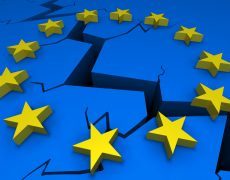
View On WordPress
1 note
·
View note
Text
Under the Overcoat: Are we the baddies? Russian civil-military relations and the bomb
In this episode, we analyse who is really in charge of the Russian military and its nuclear weapons. The answer is far from simple. Does Putin have overwhelming control or does the military have a decisive say? What are the implications of civil-military relations on Russia’s foreign policy, defense reform, and domestic politics? And who ultimately controls the Russia’s nuclear weapons?
ECFR’s…
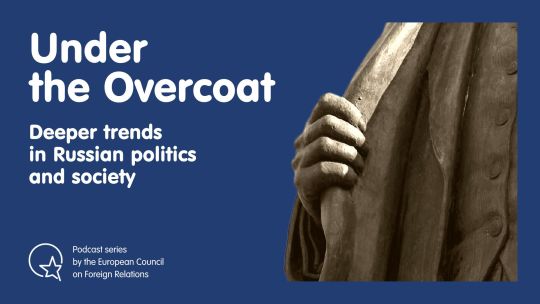
View On WordPress
0 notes